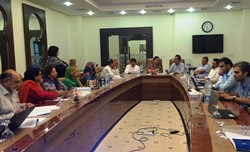 20 May 2016 – A consultative workshop on health equity and human rights curricula was conducted by WHO, in collaboration with Ministry of National Health Services, Regulation and Coordination and Provincial health departments, on 19 May 2016, to introduce and integrate the issues of health equity and human rights in the current academic curriculum of health care professionals and community health workers.
20 May 2016 – A consultative workshop on health equity and human rights curricula was conducted by WHO, in collaboration with Ministry of National Health Services, Regulation and Coordination and Provincial health departments, on 19 May 2016, to introduce and integrate the issues of health equity and human rights in the current academic curriculum of health care professionals and community health workers.
The workshop was attended by representatives of the lady health workers programme from Punjab, Sindh, Khyber Pakhtunkhwa, Balochistan, Azad Jammu and Kashmir and Gilgit Baltistan, experts and officials from provincial health departments.
The discussion was opened by Masooma Butt from WHO Pakistan with a brief introduction and rationale of integrating rights-based and equity issues into academic and health training curriculum to contribute towards achievement of universal health coverage and Sustainable Development Goals.
While addressing the gathering, Professor Dr Zakria, Punjab University, said, ‘The rights-based approach has acquired a central place in the global development agenda, but has not yet become part of health policy, health care curricula and health system mechanisms in Pakistan. This kind of intellectual interaction is always a learning process towards the realities on the ground of Pakistan’s health system.”
Experts from the lady health workers programme principally agreed on the need for the introduction of rights-based and equity issues in training packages although raised concerns about provincial realities following health devolution of the programme and the importance of tangible results arising from capacity-building conducted in this field.
Dr Sabeen Afzal from the Ministry concluded that addition of health equity and human rights in lady health workers training packages needs further deliberation at provincial level to work out modalities and entry points for smooth induction.
Related links
Universal health coverage
Sustainable Development Goals
 20 May 2016 – A consultative workshop on health equity and human rights curricula was conducted by WHO, in collaboration with Ministry of National Health Services, Regulation and Coordination and Provincial health departments, on 19 May 2016, to introduce and integrate the issues of health equity and human rights in the current academic curriculum of health care professionals and community health workers.
20 May 2016 – A consultative workshop on health equity and human rights curricula was conducted by WHO, in collaboration with Ministry of National Health Services, Regulation and Coordination and Provincial health departments, on 19 May 2016, to introduce and integrate the issues of health equity and human rights in the current academic curriculum of health care professionals and community health workers.
The workshop was attended by representatives of the lady health workers programme from Punjab, Sindh, Khyber Pakhtunkhwa, Balochistan, Azad Jammu and Kashmir and Gilgit Baltistan, experts and officials from provincial health departments.
The discussion was opened by Masooma Butt from WHO Pakistan with a brief introduction and rationale of integrating rights-based and equity issues into academic and health training curriculum to contribute towards achievement of universal health coverage and Sustainable Development Goals.
While addressing the gathering, Professor Dr Zakria, Punjab University, said, ‘The rights-based approach has acquired a central place in the global development agenda, but has not yet become part of health policy, health care curricula and health system mechanisms in Pakistan. This kind of intellectual interaction is always a learning process towards the realities on the ground of Pakistan’s health system.”
Experts from the lady health workers programme principally agreed on the need for the introduction of rights-based and equity issues in training packages although raised concerns about provincial realities following health devolution of the programme and the importance of tangible results arising from capacity-building conducted in this field.
Dr Sabeen Afzal from the Ministry concluded that addition of health equity and human rights in lady health workers training packages needs further deliberation at provincial level to work out modalities and entry points for smooth induction.
Related links
Universal health coverage
Sustainable Development Goals
 20 May 2016 – A consultative workshop on health equity and human rights curricula was conducted by WHO, in collaboration with Ministry of National Health Services, Regulation and Coordination and Provincial health departments, on 19 May 2016, to introduce and integrate the issues of health equity and human rights in the current academic curriculum of health care professionals and community health workers.
20 May 2016 – A consultative workshop on health equity and human rights curricula was conducted by WHO, in collaboration with Ministry of National Health Services, Regulation and Coordination and Provincial health departments, on 19 May 2016, to introduce and integrate the issues of health equity and human rights in the current academic curriculum of health care professionals and community health workers.








